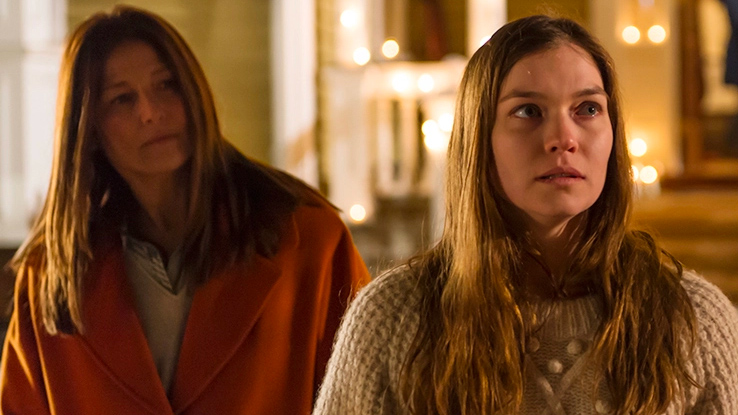Reta Winters (Catherine Keener) has many reasons to be happy. Suddenly, all the quiet satisfactions of her well-lived life disappear in a moment when her eldest daughter Norah (Hannah Gross) inexplicably drops out of college and is found on a Toronto street corner, pan-handling and refusing to speak, holding a cardboard sign reading GOODNESS. Here Hannah Gross talks about preparing for the demanding role and what it was like to work with Irish director Alan Gilsenan.
Watch the trailer for UNLESS
Q: What aspects of Norah’s character drew you to the role?
Her silence. For obvious reasons, it could be hard to consider it an attribute of strength when it’s most often something forced upon people. But in thinking of someone who would choose it, wilfully, immediately one senses a person in possession of great conviction, made even more unique by how young she is (or I guess you could argue it’s how young she is that enables her idealism). And this is very interesting in juxtaposition to the cipher quality the silence allows for and creates when she is out in the world, moving through varying degrees of visibility to those around her, even and especially the people closest to her. It was something I thought about a lot before and during the shoot, the act of embodying a blank slate, so to speak.
Q: Had you read the novel by Carol Shields before filming?
I’d read her other novels – The Stone Diaries and Larry’s Party, but not Unless.
Q: Was it difficult to get into Norah’s headspace, given that she abandons all she knows and loves to live a very different life on the streets?
I think everyone can relate to some degree to that moment that seems to be a hallmark of any coming-of-age narrative, when something shifts and what you’ve known suddenly becomes unfamiliar; when you begin to question the world around you. Most are successful though in choosing to ignore it or push it aside in order to survive. So it was interesting to try to sink into someone who can’t, or doesn’t want to. I spent a lot of time going back and forth in wondering how wilful or passive Norah’s decision was in taking these doubts to their most extreme expression.
Q: Did you do any research with homeless support groups in Toronto?
Through Alan and our production manager, I talked to the women who run the shelter we shot at.
Q: Did this role change your perspective on the homeless?
Words like unseen or overlooked are used frequently enough in relation to homelessness that they lose meaning, but this film forced me to reckon with the staggering weight those words carry when used to talk about people. And, of course, my own complicity in why they are used.
Q: Some of the outdoor door scenes were filmed using hidden cameras with the public not realising they were part of a shoot, how did this effect filming?
Sometimes when I think about the film, it appears to me almost more as an organism, a living, breathing thing.
Q: What was it like to work with Irish director Alan Gilsenan?
It was shit!
Alan is someone who moves through the world with enormous and effortless openness and care, which perhaps is a uselessly obvious statement given it’s made self-evident by this film. But he is a beautiful person and artist. And incredibly thoughtful director. I felt very lucky.
Q: In the context of the film, what does goodness come to represent?
Well, I think it remains somewhat open ended, doesn’t it? Or elusive maybe is the better word, because I think what the film does so well in illustrating is the mysterious quality goodness comes to possess when you are looking for its core. Either too simple or not simple enough to grab onto and give a static definition. I think Norah was trying to figure out how to get there without knowing exactly what it was. Which is maybe true for anyone wanting to seek it out.
Q: You’ve recently starred in the hugely successful Netflix show ‘Mindhunter’, were you surprised by how popular it’s become?
You expect there to be a certain amount of attention, because it’s Fincher, and it’s warranted. But it’s very cool to see how enthusiastic the response is, especially for a show that’s far more methodical and analytical than the average serial. I’m really proud to be a part of it.
Q: Finally, What’s next for you?
I got to work on two films in the fall that I’m very excited about, one directed by Tom Quinn and the other by Rick Alverson.
UNLESS IS AT IRISH CINEMAS FROM MARCH 16th


